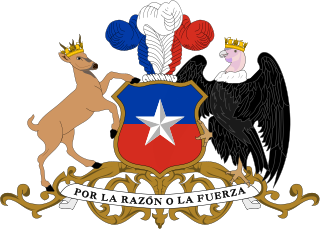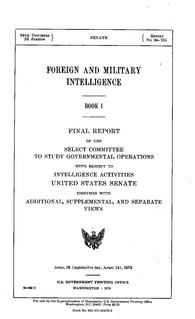
The Socialist Party of Chile is a political party within the centre-left Nueva Mayoría. Its historic leader was President of Chile Salvador Allende, who was deposed in a coup d'état by General Pinochet in 1973. Twenty-seven years later, Ricardo Lagos Escobar represented the Socialist Party in the 1999 presidential elections. He won 48.0% in the first round of voting and was elected with 51.3% in the second round. In the legislative elections on 16 December 2001, as part of the Coalition of Parties for Democracy, the party won 10 out of 117 seats in the Chamber of Deputies and 5 out of 38 elected seats in the Senate. After the 2005 elections, the Party increased its seats to 15 and 8, respectively. In the 2009 elections, it retained 11 Congressional and 5 Senate seats.
Chile is a country in the southern South America. It borders the countries of Peru, Bolivia and Argentina, and is bordered by the Pacific Ocean. Chile became an independent state in 1810. United States intervention in Chilean politics started during the War of Chilean Independence. The influence of the United States of America in both the economic and the political arenas of Chile has gradually increased over the two centuries since, and continues to be significant.

The Concertación was a coalition of center-left political parties in Chile, founded in 1988. Presidential candidates under its banner won every election from when military rule ended in 1990 until the conservative candidate Sebastián Piñera won the Chilean presidential election in 2010. In 2013 it was replaced by New Majority coalition.

The 1973 Chilean coup d'état was a watershed moment in both the history of Chile and the Cold War. Following an extended period of social unrest and political tension between the opposition-controlled Congress of Chile and the socialist President Salvador Allende, as well as economic warfare ordered by US President Richard Nixon, Allende was overthrown by the armed forces and national police.
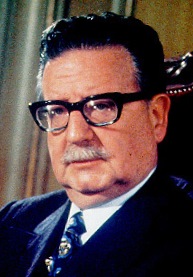
Presidential elections were held in Chile on 4 September 1970. Salvador Allende of the Popular Unity alliance won a narrow plurality in the public vote, before having his victory confirmed by a Congressional vote after the Christian Democrats voted in favour of his candidacy.

Salvador Allende was the president of Chile from 1970 until 1973, and head of the Popular Unity government; he was the first Marxist ever to be elected to the national presidency of a liberal democracy. Though the 1970 election was lawful, in August 1973 the Chilean Senate declared the Allende government to be "unlawful" in large part due to its practice of unconstitutional expropriation of private property. Allende's presidency ended with a military rising before the constitutional end of his term.
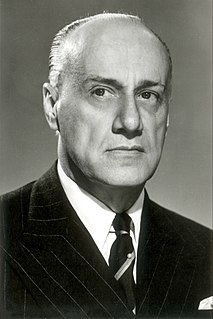
Presidential elections were held in Chile on 4 September 1958. The result was a victory for Jorge Alessandri, who ran as an independent.
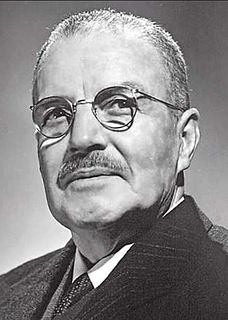
Presidential elections were held in Chile on 4 September 1952. The result was a victory for Carlos Ibáñez del Campo, who ran as an independent.

Presidential elections were held in Chile on February 1, 1942. The result was a victory for Juan Antonio Ríos of the Radical Party, who received 56% of the vote.

Presidential elections were held in Chile on 25 October 1938. The result was a narrow victory for Pedro Aguirre Cerda of the Radical Party, who received 50.5% of the vote.

Presidential elections were held in Chile on September 4, 1946. The result was a victory for Gabriel González Videla of the Radical Party, who received 40% of the public vote and 75% of the Congressional vote.
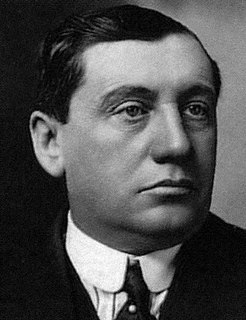
General elections were held in Chile on 30 October 1932. Arturo Alessandri of the Liberal Party was elected president, whilst the Conservative Party and Radical Party emerged as the largest parties in the Chamber of Deputies.

Presidential elections were held in Chile on 4 October 1931. The result was a victory for Juan Esteban Montero of the Radical Party, who received 64% of the vote.

Presidential elections were held in Chile on 22 May 1927, following the resignation of President Emiliano Figueroa. The result was a victory for Interior Minister Carlos Ibáñez del Campo, who ran as an independent and received 98% of the vote.

Presidential elections were held in Chile on 22 October 1925. They were the first direct elections in the country's history and the first to be held under the new 1925 constitution. The result was a victory for Emiliano Figueroa, who received 71% of the vote.

General elections were held in Italy on Sunday 18 April 1948 to elect the First Republican Parliament. They were heavily influenced by the Cold War confrontation between the Soviet Union and the United States, and are now best known for the covert political warfare waged by the US State Department and Central Intelligence Agency on behalf of the Christian Democratic Party (DC).

José Andrés Rafael Zaldívar Larraín, popularly known as El Chico Zaldívar, is a prominent Chilean Christian Democrat politician. Andrés Zaldívar is of Basque descent.

General elections were held in Bolivia on 14 July 1985. As no candidate for the presidency received over 50% of the vote, the National Congress was required to elect a President on 4 August. Although Hugo Banzer of Nationalist Democratic Action received the most public votes, Congress elected Víctor Paz Estenssoro of the Revolutionary Nationalist Movement.






